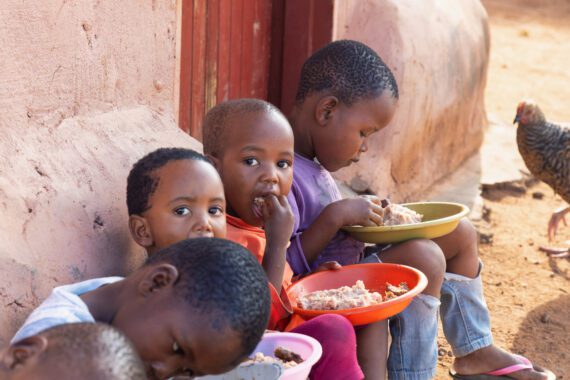By Rev. Eugene Cho
The pandemic has unquestionably increased hunger.
We know how to dramatically reduce severe hunger. Because of the COVID-19-caused hardship and the relief bills passed to address it, our country has gathered new evidence about how well domestic safety net programs work. Recent research has confirmed the most effective nutrition interventions.
We also know what it would take: with roughly $1 for every $321 in the global gross domestic product, we could end hunger by 2030.
If it would cost so little, and we know how to do it, why have we not yet taken the steps to ensure that every child in every nation in the world has the food they need each day?
The answer is political will. We need the political will to tackle hunger’s causes. Or more accurately, we need the human will to create the political will.
We need to convince our nation’s leaders, and the world’s leaders, to put in place the policies and programs that have been proven to work to address hunger. Throughout this year, Bread for the World members have done everything in our power–in prayer, in action, and in giving–to do just that.
And together, we have achieved promising progress against hunger in 2021.
1. New Global Nutrition Legislation Introduced
The House and Senate are both considering the Global Malnutrition Prevention and Treatment Act (H.R. 4693 and S.2956), which would scale up the prevention and treatment of global malnutrition and impact tens of millions of people around the world. Read more »
In July, the House of Representatives Foreign Affairs Committee introduced and passed the Global Malnutrition Prevention and Treatment Act (H.R. 4693), led by Rep. Michael McCaul (R-TX), Rep. Gregory Meeks (D-NY), Rep. Young Kim, (R-CA), and Rep. Chrissy Houlahan (D-PA).
This bipartisan legislation will show the world what it looks like to really prioritize hunger reduction (and even more importantly, to prioritize laying a better foundation for human lives, for families, for communities, for nations–by prioritizing nutrition). The Act will bring greater strategic vision, coordination, effectiveness, and accountability to our existing global nutrition efforts in a way that supports and partners with local and country-led nutrition strategies and allow us to better reach women and children with life-saving nutrition interventions.
Honorary Bread for the World board member Sen. Chris Coons (D-DE), Sen. John Boozman (R-AR), Sen. Tim Kaine (D-VA), and Sen. Roger Wicker (R-MS) introduced the Senate version of the Global Malnutrition Prevention and Treatment Act in September. Bread for the World secured endorsements from 1,000 Days, Alliance to End Hunger, CARE, Farm Journal Foundation, Food for the Hungry, Global Health Council, HarvestPlus, Helen Keller International, InterAction, ONE Campaign, RESULTS, Save the Children, UNICEF USA, and World Vision US.
The Act is supported by Republican and Democratic nutrition champions. That members of our government have come together, setting aside all other issues where they do not agree, to support global nutrition legislation is remarkable–and is thanks to Bread for the World members and others across the country asking their elected leaders to co-sponsor. Read more »
Achieving this level of bipartisanship in this environment is significant. Bread worked with legislators and their staff on both the concept and drafting language and are now building on the relationships and commitments formed when we worked on the global nutrition resolutions in 2019 and 2020 to move this forward.
So far, Bread for the World members have been directly told by 17 of the 24 House Republicans and 12 of the 25 House Democrats “yes” to cosponsoring in our meetings with them.
“Bread for the World has broadened the political space around global nutrition in a way that few others have” said Matt Gross, Bread for the World’s director of organizing and capacity building. “At the same time, we are stronger by working in coalition, so we cannot claim sole credit for these responses. But our success is not tempered through sharing credit.” Bread for the World is delighted by the partnership of many organizations, in Washington, D.C. and in congressional districts and states throughout the country, for their advocacy and support of this global nutrition legislation.
You made this possible. Thank you.
2. Child Tax Credit Expanded for One Year
Families with no earnings can now receive the Child Tax Credit, the amount each family can receive is higher, and payments can be sent monthly rather than once annually. Read more »
Early this year, the American Rescue Plan Act of 2021 became law. It expanded the Child Tax Credit for one year, made it fully refundable so families with no earnings get the full benefit, and increased the maximum benefit from $2,000 per child aged 0-16 to $3,600 for children aged 0-5 and $3,000 for children aged 6-17.
In November, the House of Representatives passed the Build Back Better Act, which would expand the Child Tax Credit for another year and make the full refundability of the credit permanent. While the Senate has yet to act on the legislation, this activity is significant progress–and a place for strong Bread advocacy to be applied in 2022.
This could cut child poverty in the U.S. almost in half. Read more »
The expansion of the Child Tax Credit will do more to reduce hunger among our nation’s children than any single policy has in decades. These changes could reduce child poverty overall by almost 45 percent.
It would also help address racial equity: Black child poverty could be reduced by 52 percent, Hispanic child poverty by 45 percent, Native American child poverty by 62 percent, Asian American and Pacific Islander child poverty by 37 percent, and White child poverty by 39 percent.
Since the Child Tax Credit payments have been sent, we know that most families are using the tax credit to buy food. Because of this expansion, 65 million children in our country have the opportunity to be well fed and supported as they grow and learn. Read more »
In the first few months of the expansion, research showed that 51% of families used the Child Tax Credit to buy food. The next two most popular uses were paying essential bills (36%) and buying clothing and other essentials for their children (30%). The rate of severe food insecurity dropped by almost 30% among eligible families due to these payments.
Bread for the World members advocated in Washington, DC, and across America, to encourage their members of Congress to support the Child Tax Credit. We also worked to connect targeted members of Congress with constituents in their districts who had benefited from the Child Tax Credit and have seen dramatic change because of programs like it that give struggling families a lifeline during moments they need it most. Read more »
One example of how Bread for the World members advocated for the Child Tax Credit this year is through building and sustaining a connection with Sen. Joe Manchin (D-WV). This summer, the Circle of Protection, which Bread co-convenes and which represents every major family of U.S. Christianity, brought national faith leaders to a meeting with the Senator.
In the fall, Bread for the World organized an in-district meeting with seven senior faith leaders from the Senator’s state. They spoke powerfully about the impacts on hunger they have seen in West Virginia because of anti-hunger programs.
Following that meeting, one attendee, Rev. Jeff Allen of the West Virginia Council of Churches, was interviewed by a local Charleston television station. He said, “This is really generational legislation. It will impact children today, but it will impact their future and their children’s children.” Several faith leaders published op-eds, including the Rt. Rev. W. Michie Klusmeyer, Bishop Steiner Ball, and Rev. Alton Dillard.
Back in Washington, DC, Bread for the World shared those locally published op-eds with the Senator’s Washington, DC staff.
In December, Sen. Manchin’s office reached out to these faith leaders to ask them for another meeting, asking that they bring families who have been directly impacted by the Child Tax Credit.
This circle of influence, initiated locally and reinforced nationally (and vice versa), is one way Bread for the World advocates create momentum on an issue, providing personal perspectives and education that help our elected leaders make strong decisions. While Senator Manchin has not made a formal statement or position announcement on the Child Tax Credit, we know that he has heard the policy research, national-level support, and local perspectives about the anti-hunger policies and programs that we believe will be most effective.
You made this possible. Thank you.
3. Bipartisan Congressional Support for International Nutrition Funding Increased
We secured an unprecedented level of bipartisan support from members of Congress for increasing funding for nutrition for 2022. Read more »
Bread for the World board member Rep. Jim McGovern (D-MA) worked with Rep. Brian Fitzpatrick (R-PA) on a “Dear Colleague” letter calling for increased nutrition funding under Global Health Programs in 2022–specifically, $300 million in nutrition appropriations for Fiscal Year 2022.
In the end, 135 bipartisan members of Congress signed on, including one more Republican than last year.
Garnering this level of bipartisan support is a success not only because of the adverse political environment in Congress this year, but also because of the significant increase in funds requested in comparison to last year. Read more »
We accomplished this by pairing strong Washington, DC-based advocacy with strong field-based advocacy. We targeted members of Congress who signed a similar letter last year and those who cosponsored H.Res. 189, the global nutrition resolution Bread for the World worked on in 2019 and 2020.
In Washington, DC, Bread staff reached out to more than 300 Hill offices and coordinated with coalitions and other national anti-hunger organizations who also reached out in support of the same request. At the same time, Bread for the World members reached out to 50 targeted members of Congress from their congressional districts.
The increased funding would save the lives of more than 160,000 children. It would also prevent stunting for more than 550,000 children, treat more than 3 million wasting children, and prevent anemia for more than 12 million women.
You made this possible. Thank you.
4. Anti-Hunger Measures Included in COVID-19 Relief Bills
In relief legislation, we saw expansions to the 15% SNAP (formerly called food stamps) increase and pandemic unemployment insurance, debt relief for Socially Disadvantaged Farmers and Ranchers, and robust funding for the international COVID-19 response. Read more »
These were included in the American Rescue Plan passed in March 2021.
The Build Back Better Act, passed by the House of Representatives in September, strengthens child nutrition programs, invests in vital maternal health programs, and improves access to high-quality childcare. Bread for the World members around the country are encouraging their Senators to support the bill this fall and winter.
Bread for the World members contributed to this success by advocating for these programs alongside other programs that we have not traditionally lobbied for, but which are critical to their success. For example, more parents will be able to certify that they qualify for WIC (the Special Supplemental Nutrition Program for Women, Infants, and Children) benefits if they have paid leave from work that makes it possible to take their child to a healthcare provider. Read more »
Bread for the World advocated for a human infrastructure package that ensures children’s nutritional needs are met in the crucial 1,000-day window between a pregnancy and a child’s second birthday. These programs are aimed at creating an environment in which families and mothers can ensure our nation’s most vulnerable children receive the care and nutrition they need.
In Washington, DC, Bread for the World sent a letter to Tom Vilsack, Secretary of the U.S. Department of Agriculture, asking his department to make changes to help access to healthy foods, meaningfully tackle chronic diet-related conditions, and resolve barriers to the WIC shopping experience before the end of the year. We also sent a letter urging Secretary Vilsack to extend universal school meals and expand the program for the use of electronic benefit transfer cards, thus ensuring that no matter where children live, they have access to the nutrition the need to thrive.
The measures included in the COVID-19 relief legislation will help the millions of people in America who have struggled to put food on the table because of the pandemic’s hardships. The SNAP increase alone impacted approximately 40 percent of families who receive SNAP, or 12 million people.
You made this possible. Thank you.
5. SNAP Benefits Permanently Increased
Bread for the World’s nearly-40-year history of advocacy on SNAP, our work on the 2018 Farm Bill, and this year, letters to the Administration and meetings with targeted members of Congress, all came to fruition when the Administration announced that it would permanently increase SNAP benefits.
The increase is a result of a reexamination of the mathematical model used to calculate SNAP benefits mandated by the 2018 Farm Bill. The average benefit will rise more than 25 percent from pre-pandemic levels.
All 42 million participants in the SNAP program will receive the additional assistance on an ongoing basis.
You made this possible. Thank you.
6. BONUS: $11 billion Committed to Global Nutrition
During first week of December, the United States committed $11 billion over three years to combat global malnutrition. While we do not yet have full details, we are pleased at the high level of financial commitment. Read more »
This commitment was made at the Tokyo Nutrition for Growth Summit 2021. Nutrition for Growth is a global pledging moment that occurs every four years to drive collective action toward ending malnutrition.
Bread for the World has advocated with national partners for a strong U.S. commitment at Nutrition for Growth for years. This year, we formed a U.S. CEO Council for Nutrition that brings together the heads of several nutrition-concerned organizations to take joint, coordination action to advance our country’s global nutrition policies and programs. Read more »
Bread for the World sponsored two side-events at Nutrition for Growth (one on the role parliamentarians play in advancing global nutrition and one announcing the U.S. government’s Global Nutrition Coordination Plan 2.0). We also placed a community ad urging the U.S. government to make a strong commitment.
Global malnutrition is the underlying cause of almost half of all childhood deaths globally. With the right nutrition in the first 1,000 days, we can ensure healthy body and brain development, stronger immune systems, more years of education, and higher lifetime potential for millions of children.
Conclusion
This year, Bread for the World advocates gathered, prayed, acted, and gave together to great effect.
We will share more detail of exactly how Bread for the World members engaged in the fight to address hunger and what a difference you made in our annual report. Let me just say for now, that we know–we know–that hundreds of millions of people will benefit from what Bread advocates, partners, members, and supporters fought for and achieved this year.
While we have seen setbacks because of the pandemic, we have been able to mitigate a situation that could have been much worse. Thanks to our work together, ending hunger and malnutrition by 2030 is still feasible.
You made this possible. As you and yours gather for the upcoming holidays, I hope you will share gratitude that what we have done together has had significant impact.
I am grateful for you. And I am grateful for how God is moving in our time to end hunger and poverty.
Rev. Eugene Cho is president and CEO of Bread for the World



